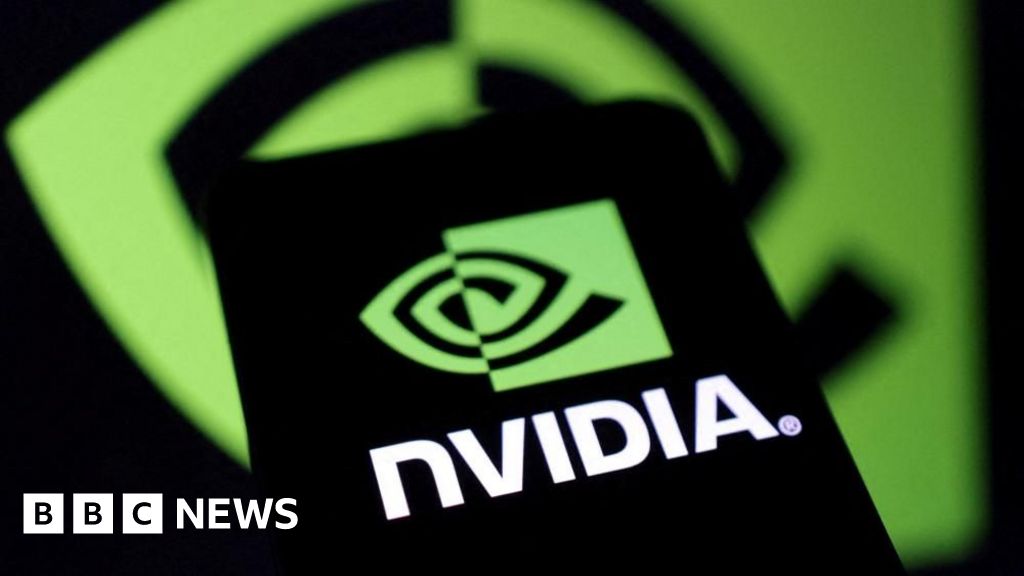Nvidia Reports Record Q1 Revenue Jump Amidst China Market Focus

AI chipmaking giant Nvidia announced a remarkable first quarter for 2025, with revenue soaring 69% year-over-year to $44.1 billion, driven by relentless global demand for its artificial intelligence chips. This strong performance occurred despite navigating a complex geopolitical landscape, particularly concerning U.S. trade policies with China. The company's shares reacted positively, climbing over 4% in after-hours trading, solidifying its position as the world's second-most-valuable company with a market capitalization of $3.3 trillion, trailing only Microsoft and surpassing Apple.
In its financial report on Wednesday, May 29, 2025, Nvidia disclosed that its net income for the quarter rose 26% to $18.78 billion. While the company surpassed Wall Street's sales expectations of $43.28 billion, it slightly missed profit predictions, which were set at $19.49 billion. Despite this minor shortfall on the profit side, the overall financial results underscored Nvidia's continued dominance in the AI hardware sector and its significant growth trajectory. For the first time in the AI era, Nvidia's quarterly sales also exceeded those of social media giant Meta, with its net income being 13% larger than Meta's profit in their respective recent quarters.
The U.S. government's actions have created a volatile environment for Nvidia's business. Recent policy shifts included blocking AI chip sales to China, followed weeks later by approving similar sales to the Middle East. The Trump administration's restrictions on chip exports to China are projected to cost Nvidia $4.5 billion, a figure revised down from an earlier estimate of $5.5 billion in mid-April. More specifically, these export limitations resulted in $2.5 billion in lost sales during the first quarter alone, with an additional $8 billion impact anticipated for the current quarter. Despite these curbs, Nvidia's H20 chip, targeted by new April restrictions from the Trump administration, still generated $4.6 billion in revenue as Chinese customers stockpiled the component. China constituted 12.5% of Nvidia's total revenue in the quarter.
Nvidia's CEO, Jensen Huang, provided extensive commentary on the trade situation. He praised former President Donald Trump’s decision to rescind a Biden-era export rule that had restricted the global flow of Nvidia chips but cautioned that the lack of a replacement rule introduces market uncertainty. Huang was critical of the new April restrictions imposed by the Trump administration, which halted sales of the H20 chip in China, a product previously viewed as a significant growth driver. He argued that U.S. AI export controls should aim to strengthen American platforms rather than isolate them. Huang warned that banning Chinese open-source AI models like DeepSeek and Qwen from Nvidia's infrastructure could diminish U.S. visibility into global AI development, potentially ceding a strategic advantage to competitors. He emphasized that the U.S. must strive to remain the preferred platform for open-source AI development through continued collaboration with leading developers worldwide, including those in China, to ensure U.S. leadership in global AI innovation.
Looking ahead, Nvidia projected robust growth, forecasting second-quarter revenue of approximately $45 billion, which would represent a 50% increase from the previous year. While this projection was slightly below some analyst expectations, the company highlighted emerging multi-billion dollar opportunities in markets such as Saudi Arabia, the United Arab Emirates, and Taiwan. Analysts generally viewed the financial impact from the China restrictions as a manageable, short-term challenge within a broader narrative of powerful long-term growth for the chipmaker. Huang was commended for contextualizing these trade-related setbacks.
Jensen Huang also shared his broader vision, stating, "Every nation now sees AI as core to the next industrial revolution." He lauded President Trump's recent Middle East tour, which resulted in several technology-related deals, describing them as beneficial for the U.S. by boosting employment, infrastructure, tax revenue, and reducing the trade deficit. Furthermore, Huang expressed support for reshoring manufacturing, envisioning U.S. factories operated by advanced robotics, a vision he stated Nvidia shares and aims to enable with its technology.
In its latest regulatory filing, Nvidia also outlined new risks stemming from the ongoing U.S.–China tech standoff. The company expressed concerns that U.S. restrictions on Chinese open-source AI models and potential curbs on connected vehicle technologies could negatively affect its operations, particularly as its automotive chip business begins to establish a foothold in the Chinese market. These factors add layers of complexity to Nvidia's strategic planning as it continues to expand its influence in the rapidly evolving global technology landscape.









